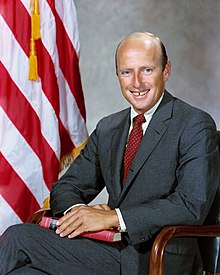Pete Conrad
| Charles "Pete" Conrad Jr. | |
|---|---|
 |
|
| NASA Astronaut | |
| Nationality | American |
| Status | Deceased |
| Born |
June 2, 1930 Philadelphia, Pennsylvania, U.S. |
| Died | July 8, 1999 (aged 69) Ojai, California, U.S. |
|
Other names
|
Charles Conrad Jr. |
|
Other occupation
|
Naval aviator, test pilot |
| Princeton University, B.S. 1953 | |
| Rank | Captain, USN |
|
Time in space
|
49d 03h 38m |
| Selection | 1962 NASA Group 2 |
|
Total EVAs
|
4 |
|
Total EVA time
|
12 hours 44 minutes |
| Missions | Gemini 5, Gemini 11, Apollo 12, Skylab 2 |
|
Mission insignia
|
|
| Retirement | December 1973 |
| Awards |
|
![]() Two Distinguished Flying Crosses
Two Distinguished Flying Crosses
Two Navy Distinguished Service Medals![]() Two NASA Distinguished Service Medals
Two NASA Distinguished Service Medals
Two NASA Exceptional Service Medals![]() The Congressional Space Medal of Honor (1978)
The Congressional Space Medal of Honor (1978)
The Collier Trophy (1973)
The Harmon Trophy (1974)
Navy Astronaut Wings
Charles "Pete" Conrad Jr. (June 2, 1930 – July 8, 1999), (Captain, USN), was an American naval officer and aviator, aeronautical engineer, test pilot, and NASA astronaut, and during the Apollo 12 mission became the third man to walk on the Moon. He set an eight-day space endurance record along with his Command Pilot Gordon Cooper on the Gemini 5 mission, and commanded the Gemini 11 mission. After Apollo, he commanded the Skylab 2 mission (the first manned one), on which he and his crewmates repaired significant launch damage to the Skylab space station. For this, President Jimmy Carter awarded him the Congressional Space Medal of Honor in 1978.
...
Wikipedia
